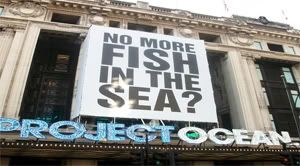
photo credit Stephanie Dickens
Earlier this summer, Selfridges & Co launched its Project Ocean campaign, focusing on the threats of overfishing and poor fishing practices in the UK and worldwide. Partnering with over 20 environmental groups, Selfridges put together talks, activities, learning opportunities, workshops, information and their famous store-front windows to help raise awareness about the threats the ocean is currently facing.
 Here's some lovely numbers:
Here's some lovely numbers:-Nearly 4 million people saw Project Ocean’s windows
-Over 8 million Britons saw the Project Ocean campaign advertising
-45,000 Selfridges Fish Guides were given away
-More than 17,500 customers took part in an Ultralounge talk or activity, with an average of 700 people each day
-550 people attended the 4 Ocean Talks
-Coley Fish and chips in HIX [Selfridges' restaurant and champagne bar] became the number one selling dish on its menu
Selfridges has also raised over £120,200.00 for the Zoological Society of London (ZSL) to create marine reserves. One area has already been set aside in the Philippines for the protection of fish and other marine life. They're still accepting donations, so if you're feeling generous today and want to be part of a new marine protected area, click here (and after you've sent your donation, click here to see your name on a fish)!
Four talks were held on the subjects of sustainable fishing and marine conservation. The first was called "Fishing in Troubled Waters" and was chaired by End of The Line author Charles Clover, with guests Nigel Edwards of Seachill and Iceland Group, fashion designer Katherine Hamnett, Jeremy Percy of National Under Ten Metre Fisherman's Association (NUFTA) and Hugh Fearnley-Whittingstall of Channel 4 and Hugh's Fish Fight.
Some highlights of this talk included Clover's statistics: 32% of the world's fish stocks are currently exploited, 85% are at or beyond their limits, and that the human population will rise 1/3 by 2050. It doesn't take a genius to put these pieces together. With a disproportionate amount of the human population relying on the sea for their main sources of food and protein, we are on a collision course with reality if we continue to fish the way we have been fishing.
One particular clip shown by Fearnley-Whittingstall illustrated the complications of fishing laws and waste catch. Fearnley-Whittingstall was filmed on a fishing boat when the haul was brought on board and sorted. Only a few individual fish were kept because they were the allowed and targeted species - the only species that by law the fishermen were allowed to keep. Twenty baskets of bycatch - more than the number of targeted species caught - had to be thrown overboard as waste. The fishermen had never seen it laid out before them like this and were visibly upset - one even lifting up a now-dead "waste" fish and saying that it was a beautiful specimen, one that would be hard to find nowadays, and it is being wasted for nothing. The bycatch caught on this one trip would have fed 2,000 people. It's not always the fishermen's fault that these species die and go to waste; sometimes the laws just aren't up to par.
There is hope, though. Sustainable fisheries and buying fish from healthy stocks is coming to the world's attention slowly but surely. Talks are being held in government buildings in many nations, but the truth is that there is still a long way to go.
But you can help. Change in a consumer market needs to come from the consumers.
◦There are many fish guide apps now available to help consumers be more informed on restaurant and shopping trips. Ask where and how your fish is caught (You'll likely be met with confused looks, but let your providers know you care! They will respond!).
◦Don't buy red-listed fish - if we only support fish from sustainable sources, the market will have to adjust to reap its profits.
◦Spread out your species - did you know that there are over 50 different species of tuna? Why not try skipjack instead of bluefin? Have you tried mackerel? Sprats?
◦Don't eat at restaurants that serve red-listed fish species, and let them know you're not impressed by their "fancy" selection.
◦Spread the word!
Stephanie at Global Ocean was lucky enough to attend all four of these talks. If you'd like their summary, please click through to her write-up!
No comments:
Post a Comment